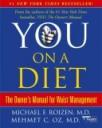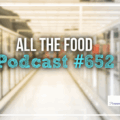I am always on the lookout for motivating items to help me stay on track during weight loss because no matter how high my motivation level may be, I invariably will go through slumps. In December 2006 I was having a hard time getting motivated and was searching for something that would actually get me excited about getting back on my weight loss program.
I was intrigued when I came across the book “YOU On A Diet” by Michael F. Roizen M.D., and Mehmet C. Oz M.D.
I personally don’t believe in “diets” (which will be a future post’s topic), however I flipped through the table of contents and the pages and what caught my eye were the illustrations. I also liked the line on the back cover that read “The only way that dieting can work — really work — is to make eating so easy and automatic that you never even realize that you’re dieting”. I bought the book and started reading.
I became enamored with “YOU On A Diet” and found that I didn’t want to put it down, almost as if I were reading a novel. In my opinion, most of us know more about how our car works than we do about how our body works, and this book clearly explains your body to you in a fun, entertaining manner. The illustrations by Gary Hallgren are wonderful, full of detail and simply delightful to explore.
There were two topics that were covered in the book that turned my thinking around and helped influence me to want to eat healthy foods: one was the topic of High Fructose Corn Syrup (HFCS), and the other was on the “omentum” organ, which I had never before heard of.
HFCS is found in most processed foods today. It is six times as sweet as cane sugar, very cheap to produce, and therefore very cheap to use in food manufacturing. It aids in shelf life so it is found in most convenience foods, frozen foods, processed foods, and is present in foods labeled as “low-fat”. It is especially prevalent in sodas and low-fat salad dressings. HFCS is not processed by the brain as regular food.
What happens when you eat foods with this ingredient is since your body doesn’t “see” the fructose, you keep eating because your brain doesn’t get the signal that you’re full! The HFCS doesn’t turn off the hunger signals in your brain, therefore you can end up consuming large amounts of these low-fat labeled foods (or any food containing HFCS), while taking in a high amount of calories.
One step that you can take to aid your brain in telling you that you are full is to avoid eating foods that have High Fructose Corn Syrup, Corn Syrup, or Fructose listed as one of their top four ingredients. If you presently don’t read labels, you will be surprised to discover just how many foods contain these ingredients. If you make only this one change in your eating habits, you will be knocking out a large percentage of foods that are not only unhealthy for you, but that you will more than likely overeat since you will continue to feel hungry and want more and more.
The other topic covered in “YOU On A Diet” that really caught my attention was regarding the “omentum”. The omentum is an organ that resides next to your stomach and is the body’s primary storage area of fat. In a slender person, it looks rather like sheer curtains hanging from the stomach, however in an obese person, it is all clogged up and clumped with fat. The omentum’s size is an indicator of how well the person handles stress since this organ is the body’s main gauge of stress. A fat clogged omentum is indicative of poorly managed and chronic stress.
The main point that turned me off was that fact that I could basically have a big ball of fat hanging off my stomach inside my abdomen. A fat laden omentum will make a person look like they have a big belly, but instead of the fat being on the outside of the body, it is actually on the inside. That really got to me and I decided that I did not want to have a fat packed omentum hanging around.
There is much more material covered in “YOU On A Diet”, such as how the small intestine operates as the body’s second brain, that it processes emotions, and what inflammation does to the body. There is also a suggested meal plan included in the book, information on plastic surgery, clogged arteries, high blood pressure, and scads more.
All of these topics are handled in such an entertaining way, it really makes you want to keep reading; I think that is quite impressive for a book on health. I would highly recommend the book “YOU On A Diet” for a few different reasons:
- If you are looking for motivation to change your lifestyle.
- If you gain motivation to change by learning about health facts.
- If you would simply like to learn more about how your body works.
You can find it here at Amazon if you would like to learn more:






🙄 This is all great, but I already know how bad my diet is for me. I know that not exercising is also terrible and much of what this book says I already knew as well. None of this gets me to stop eating or to get off the couch and to the gym… Where’s the book for that?
Hi ktooq,
Thank you for your comments! 🙂
It sounds like you are looking for some motivation? I get motivated by different things, and “You On A Diet” really motivated me because I gained more knowledge about how my body works. That’s not to say that this will motivate everyone though, so you need to find some motivation that will really hook you emotionally. This can be different for many people: their family, kids, health concerns, vanity, it depends on what drives you.
As far as a book, that would still depend on what makes you tick. 😉 I’ve written several posts about motivation; a couple that have been popular are: What Is Your Motivation to Lose Weight, What To Do When You Have No Motivation, and How To Surrender To A Lack of Motivation. You could also check out my daily motivation and motivation categories.
It might just be that you need to commit to some lifestyle changes and take action in order to gain motivation from the action and your accomplishments. If you do want to make changes though, just don’t give up! Also, I encourage you to avoid berating yourself for your lack of action right now; it’s just where you’re at, and you can always change it if you want to. I hope this helps! 🙂
I wanted to make a comment about the previous post, knowing what to do and just not doing it.
I recommend, “Mind Over Body”. It has a diet in the book as well, but I bought it primarily for the mental aspect section.
I can totally relate to what you’re saying. I’ve read every diet book out there and I KNOW what I need to do, I just don’t.
The point this book makes (Mind over Body), you have to have a desire stronger than “I want to lose weight for the sake of losing weight”. Why do you really want to lose weight? For me personally, there are days when having the Haagen Daaz outranks my desire to be a size 4.
I haven’t yet read You On a Diet. But I have looked at their website and it looks doable. Honestly, I’m sick of the pills, shakes, gym memberships and workout equipment that collects dust and clothes. I don’t have the money, nor the desire to cook exotic food that may or may not taste all that great and watching the rest of my family eat whatever they want. The simpler the eating plan and the less expensive (time and money) the exercise portion, the better for me. Some could argue well you’d spend that much and more for healthcare, you know what, maybe I don’t see it that way since my insurance covers it. I know I’m going way off on a tangent here, but I’m just reaffirming what ktooq is saying or implying. Mind Over Body works with setting core desires and techniques to motivate yourself to work through those days when you don’t want bothered with the “diet”.
Has You On a Diet worked for you? Are you able to stick with it even when the going gets tough? How much weight have you lost or intend to lose?
Sorry for ranting, I’me venting out of my own frustration with diets and not sticking with them for any length of time.
Any feed back will be appreciated.
Thanks.
Hi Sandee,
Thanks for your comments, I can relate to your frustration. Before I found the Six Week Body Makeover plan in 2004, I was fed up with dieting and just couldn’t even consider dieting anymore. The 6WBMO is a lifestyle change though, not a diet, and it definitely works if you commit to it as a lifestyle.
The book Mind Over Body sounds right up my alley, I’d like to read it, too, thanks for the suggestion! Who is the author?
No, I haven’t followed the diet portion of the You On A Diet book. I love that book and wrote about it because it motivated me to get in gear and start eating healthy again. It’s easy to understand and learn about how your body works, and the illustrations are wonderful. I highly recommend the book to help you learn more about your body and how processed food and additives (such as the sweetener hfcs) affects your body and your weight.
In the end, all of this comes down to making lifestyle changes. Short term dieting just for the purpose of getting the weight off (followed by a return to old eating habits) just doesn’t work. I did lose 43.5 lbs with the 6WBMO, kept it off for over a year, until I returned to old ways and regained approx. 20lbs…proof that you must make lifestyle changes; you cannot expect to go back to eating like you did before, because that’s what got you in trouble and overweight! 😉
I hope this helps Sandee!